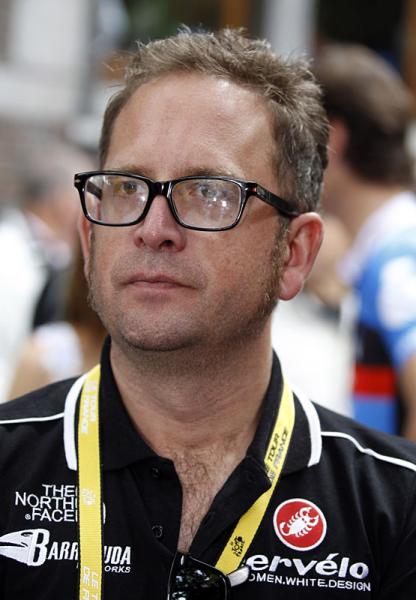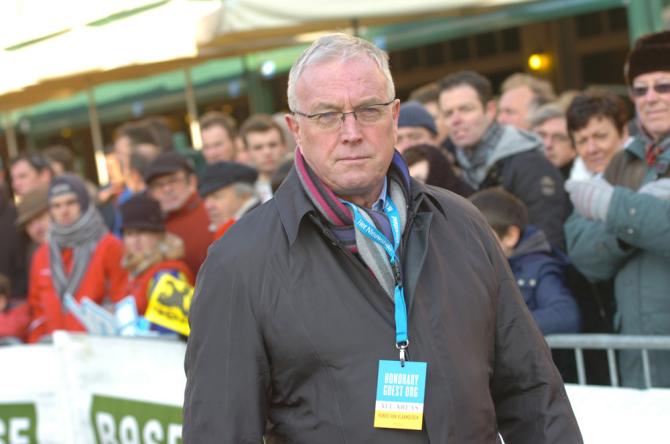Vaughters: McQuaid's record does not support campaign claims
"Real, genuine change has to start at the top", says ex-AIGCP president
The latest race content, interviews, features, reviews and expert buying guides, direct to your inbox!
You are now subscribed
Your newsletter sign-up was successful


Garmin-Sharp team manager Jonathan Vaughters has questioned the anti-doping campaign platform of UCI president Pat McQuaid made as part of his re-election bid, saying that the Irishman's history contradicts claims made in a recent interview that he is part of the "new guard" and has "changed the culture of doping" in cycling.
Two Armstrong doping controls at 2001 Tour de Suisse suspicious but not positive, UCI says
Mike Plant publicly ends his support of Pat McQuaid
Malaysia supports McQuaid's bid for re-election
USA Cycling President concerned with UCI presidential process
Malaysian motion may allow new candidates to enter presidential race
McQuaid is facing strong opposition in his re-election campaign, not just from his only opponent in the race, British Cycling's Brian Cookson, but from his own Irish Cycling Federation, members of the Swiss federation, USA Cycling, the AIGCP and a member of the UCI's Management Committee, Mike Plant.
While most of the negative press for McQuaid has revolved around the doping case of Lance Armstrong, and allegations that the UCI at worst covered up suspicious tests and at best turned a blind eye to the culture that was rife with doping, McQuaid has turned the UCI's anti-doping efforts into one of his main platform points.
McQuaid took credit for instituting the biological passport, no-needle policy, restrictions on corticosteroids and restricting the value of riders returning from doping bans by not allowing them to accumulate WorldTour points as evidence that he has championed this new, clean cycling.
That came of no surprise to Vaughters, who has butted heads with McQuaid over numerous issues as a former AIGCP president. Vaughters pointed to the controversy over a proposed amendment to change the voting rules an example of the fundamental underlying problem with cycling.
"We have a guy who is attempting to run on a platform of changing the culture of cheating, and he's doing it by bending the rules," Vaughters said.
"Cycling needs to move away from this philosophy that you get things done with a little arm-twisting, and a little rule-bending. I remember when I was coming up through the national team, and on my first trip to Europe I was taught to be sneaky - a little water bottle sling, some hanging onto the cars... I remember one time trial where I passed a guy and he got right on my wheel and stayed there because there were no judges to see. To complain about that was seen as unsportsmanlike: the philosophy was you do what you gotta do.
The latest race content, interviews, features, reviews and expert buying guides, direct to your inbox!
"[McQuaid] is part of the old guard that set the tone of 'just don't get caught' that my generation grew up with firmly planted in our heads as the way things were done in cycling. 20-year-old aspirants do not govern the tone of the sport. UCI president does. If we expect our athletes to play by the rules, then they need to lead by example.
"If we seek to eradicate doping, we have to look at the root cause. And that cause is the time and direction set by the leadership of the sport. The UCI presidency has to change for the sport to move forward. There has to be an actual change for the first step to occur."
He also recalled that all of programs that McQuaid listed as evidence of his role in cleaning up the sport were rules first instituted by teams or other organisations before being finally adopted by the UCI once they'd proven successful. "The biological passport originated with CSC, Rasmus Damsgaard, Michael Ashenden and the Agency for Cycling Ethics, and the no-needle policy was first put in place at our team in 2008. The corticosteroid rule was absolutely championed by Roger Legeay and the MPCC," he said, adding that the AIGCP pushed for the changes to points accumulated by returning dopers.
The fact that McQuaid is now taking credit for championing anti-doping is ironic considering how strongly he opposed the US Anti-Doping Agency's case against Lance Armstrong, Vaughters said.
"Pat fought USADA's jurisdiction vigorously until it was overwhelmingly apparent that the case would go forward, and then suddenly he's saying that Lance Armstrong has no place in cycling. When the athletes testified to USADA, their biggest fear was retribution not from Lance Armstrong or any other riders, but from the UCI itself."
There was one person from the UCI's Management Committee who approached USADA, however, with offers to cooperate, and that was Brian Cookson, Vaughters said, adding that he has faith that, while Cookson may not be as fiery as McQuaid, he is a strong and ethical administrator.
Yet the process of electing the new UCI president doesn't necessarily take into account the views of professional cycling, Vaughters pointed out.
The process by which the 42 delegates of the five continental confederations choose their candidate is "opaque", he says, and said "they do not interact with the world of professional cycling. The whole reason that the UCI is funded is because cycling is an Olympic sport, and the Olympics are contested by professional athletes, but the pro riders have no say in who is elected. I can only hope that the delegates will represent the true interest of the sport come September."

Laura Weislo has been with Cyclingnews since 2006 after making a switch from a career in science. As Managing Editor, she coordinates coverage for North American events and global news. As former elite-level road racer who dabbled in cyclo-cross and track, Laura has a passion for all three disciplines. When not working she likes to go camping and explore lesser traveled roads, paths and gravel tracks. Laura specialises in covering doping, anti-doping, UCI governance and performing data analysis.
